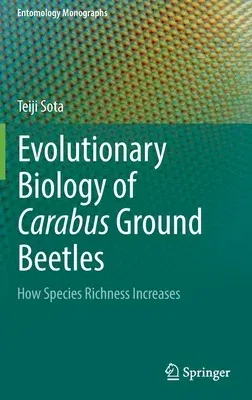Teiji Sota
(Author)Evolutionary Biology of Carabus Ground Beetles: How Species Richness Increases (2022)Hardcover - 2022, 25 November 2021

Qty
1
Turbo
Ships in 2 - 3 days
In Stock
Free Delivery
Cash on Delivery
15 Days
Free Returns
Secure Checkout

Part of Series
Entomology Monographs
Print Length
199 pages
Language
English
Publisher
Springer
Date Published
25 Nov 2021
ISBN-10
9811666989
ISBN-13
9789811666988
Description
Product Details
Author:
Book Edition:
2022
Book Format:
Hardcover
Country of Origin:
NL
Date Published:
25 November 2021
Dimensions:
23.39 x
15.6 x
1.42 cm
ISBN-10:
9811666989
ISBN-13:
9789811666988
Language:
English
Location:
Singapore
Pages:
199
Publisher:
Series:
Weight:
480.81 gm